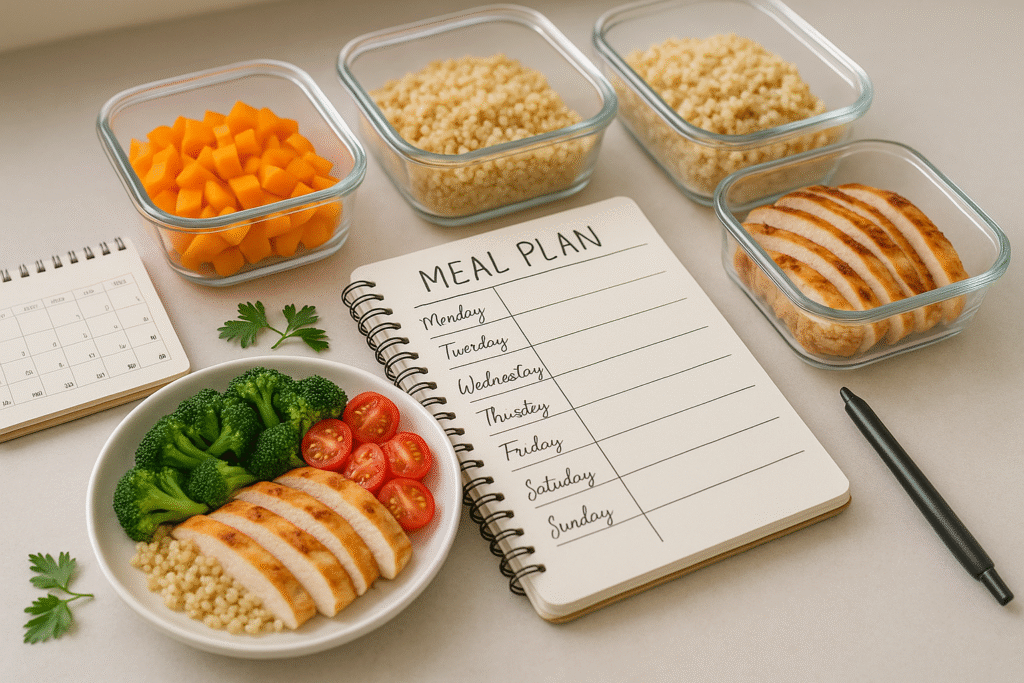Master Meal Planning: Your Blueprint for Health
Have you ever found yourself staring into an empty fridge at 7 PM, wondering what to cook, only to resort to takeout? Or perhaps you've started a healthy eating plan with great enthusiasm, only to lose momentum after a few days? If so, you're not alone. The rhythm of modern life often leaves little room for thoughtful food preparation, turning healthy intentions into last-minute compromises.
But what if there was a simple, gentle way to reclaim control over your plate, ensuring every meal nourishes both body and soul? This is where the art and science of meal planning come in. It's not about rigid rules or endless hours in the kitchen; it's about creating a compassionate blueprint for your week that aligns with your health goals and your unique lifestyle.
Unraveling the Concept - The "Why" Behind Meal Planning
Think of your body as a high-performance vehicle. You wouldn't fill a sports car with low-grade fuel and expect it to perform optimally, would you? Similarly, our bodies thrive on consistent, high-quality nourishment. Meal planning is the strategic process of deciding what you're going to eat in advance, ensuring you have the right ingredients on hand, and often, preparing components of your meals ahead of time.
The benefits extend far beyond just having food ready. Research consistently shows that individuals who plan their meals tend to consume more fruits and vegetables, have a lower intake of unhealthy fats and sugars, and are more likely to maintain a healthy weight. A study published in the Journal of the Academy of Nutrition and Dietetics found a significant association between meal planning and dietary quality, particularly among women.
From a nutrigenomic perspective, consistent, balanced nutrition provides your genes with the optimal environment to express health-promoting traits. When your body receives a steady supply of essential micronutrients, it can better manage inflammation, support detoxification pathways, and optimize cellular function. Meal planning helps you achieve this consistency, reducing the stress of last-minute food choices that can sometimes lead to less optimal selections.
Practical Application - Crafting Your Personalized Meal Plan
Step 1: Assess Your Needs and Preferences
Before you even think about recipes, take a moment to reflect. What are your health goals? Are you looking to increase energy, manage a specific condition, or simply eat more whole foods? What are your dietary preferences or restrictions? How much time do you realistically have for cooking each week? Answering these questions will lay the foundation for a sustainable plan.
Step 2: Choose Your Planning Horizon
Do you prefer to plan for 3 days, 5 days, or a full week? For beginners, a 3-day plan can be less daunting. As you gain confidence, you can extend it. Remember, this is a gentle process, not a rigid one. Start small, celebrate your successes, and adjust as needed.
Step 3: Build Around Core Components
Instead of planning individual meals, think in terms of components: a protein source (e.g., baked chicken, lentils, tofu), a complex carbohydrate (e.g., quinoa, sweet potatoes, brown rice), and plenty of colorful vegetables. You can cook larger batches of these components and mix and match them throughout the week.
Step 4: Embrace the Power of Batch Cooking
Dedicate an hour or two on a less busy day (perhaps Sunday afternoon) to prepare some core ingredients. This could include chopping vegetables, cooking grains, roasting a batch of protein, or making a large pot of soup. This simple act significantly reduces daily cooking time and decision fatigue.
Step 5: Create a Shopping List and Stick to It
Once your plan is set, make a detailed shopping list. This saves time at the grocery store, reduces impulse buys, and ensures you have everything you need to execute your plan. Think of your shopping list as your treasure map to a week of nourishing meals.
Myths and Facts - Demystifying Meal Planning
Myth 1: "Meal planning is boring and repetitive."
The Truth: While some repetition can be efficient, meal planning doesn't mean eating the same thing every day. It's about strategic variety. You can rotate through a set of favorite recipes, experiment with new ones, or simply vary the spices and sauces to create different flavor profiles from the same core ingredients. The goal is to reduce decision fatigue, not culinary creativity.
Myth 2: "You have to be a gourmet chef to meal plan effectively."
The Truth: Absolutely not! Many effective meal plans rely on simple, whole ingredients and basic cooking techniques. The focus is on nourishment and consistency, not Michelin stars. Start with recipes that have few ingredients and simple instructions, and gradually expand your repertoire as you feel more comfortable.
Conclusion: Your Journey to Mindful Nourishment
Remember: eating is a biological act, but it's also an emotional one. Let's nourish both. Meal planning is more than just organizing your food; it's an act of self-care, a commitment to your well-being, and a gentle way to bring intention back to your plate.
By investing a little time upfront, you free up mental space and energy throughout your week, allowing you to enjoy your meals more fully and make conscious choices that support your health goals. Start today, even if it's just planning your next three meals. Your body, mind, and even your wallet will thank you.
May every food choice be a conscious step toward your integral well-being. Take care of yourself with kindness, and let meal planning be your gentle guide to a healthier, happier you.


